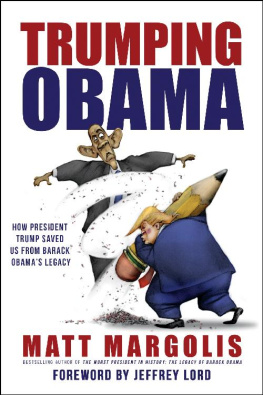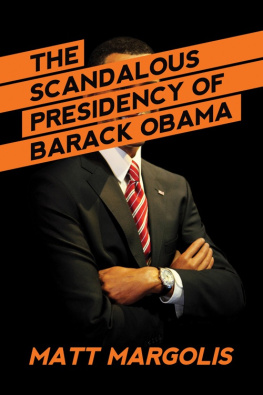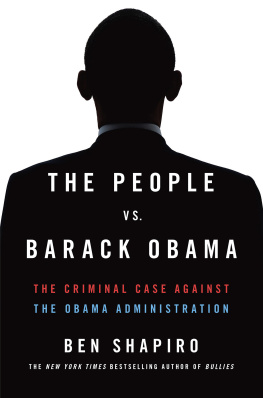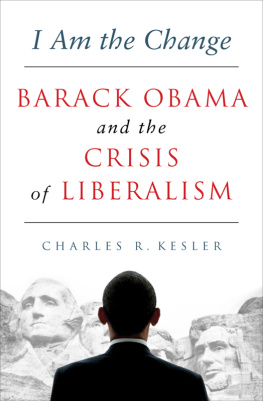OVERREACH
LEADERSHIP IN THE OBAMA PRESIDENCY
GEORGE C. EDWARDS III
TEXAS A&M UNIVERSITY

Copyright 2012 by Princeton University Press
Published by Princeton University Press, 41 William Street, Princeton, New Jersey 08540
In the United Kingdom: Princeton University Press, 6 Oxford Street,
Woodstock, Oxfordshire OX20 1TW
press.princeton.edu
Jacket Photograph: U.S. President Barack Obama speaks at a Democratic National Committee (DNC) fundraiser in Washington, DC, on Monday, May 16, 2011. Joshua Roberts/Pool/Corbis
All Rights Reserved
Library of Congress Cataloging-in-Publication Data
Edwards, George C.
Overreach : leadership in the Obama presidency / George C. Edwards III.
p. cm.
Includes bibliographical references and index.
ISBN-13: 978-0-691-15368-1 (alk. paper)
ISBN-10: 0-691-15368-X
1. Obama, Barack. 2. United StatesPolitics and government2009 3. LeadershipUnited StatesCase studies. 4. PresidentsUnited StatesCase studies. 5. Political leadershipUnited StatesCase studies. 6. Executive powerUnited StatesCase studies. I. Title.
E907.E39 2012
973.932092dc23 2011031837
British Library Cataloging-in-Publication Data is available
This book has been composed in Minion Pro
Printed on acid-free paper.
Printed in the United States of America
10 9 8 7 6 5 4 3 2 1
to Richard Neustadt
who taught us to think strategically about the presidency
CONTENTS
CHAPTER 1
Assessing Opportunities: Public Support
CHAPTER 2
Creating Opportunities? Going Public
CHAPTER 3
Evaluating Strategic Choices: Leading the Public
CHAPTER 4
Assessing Opportunities: Congressional Support
CHAPTER 5
Creating Opportunities? Leading Congress
CHAPTER 6
Evaluating Strategic Choices: Passing Legislation
CHAPTER 7
Persuasion and Opportunity in Presidential Leadership
PREFACE
IN MY EARLIER BOOK, The Strategic President: Persuasion and Opportunity in Presidential Leadership, I offered a challenge to the conventional understanding of presidential leadership. Near the time of the books publication, Barack Obama was elected president, presenting a fascinating test of my theory that presidents do not succeed by persuading others to support them but rather by recognizing and exploiting effectively the opportunities already present in their environments. In other words, presidents cannot create opportunities for change. Instead, they are dependent on exploiting the opportunities that already exist.
Obama possesses a first-class intellect, is a gifted communicator, and in the 2008 election attracted a devoted following. He and his aides concluded that he could move a highly polarized public to support his initiatives, several of which were of historic proportions. They also felt they could obtain bipartisan backing in Congress for these proposals. Many bright and politically experienced people agreed with them.
My view was quite different. It follows from my theory of presidential leadership that the president would fail to move both the public and congressional Republicans. Moreover, I argued that by asking the right questions, i.e., making accurate strategic assessments, we could predict these outcomes on the first day of the Obama presidency. In this volume, we will see which view was correct.
This book builds on The Strategic President and applies the ideas and discussion therein to predicting and explaining the politics of the Obama presidency. Because this volume is in important ways a test of the ideas presented in The Strategic President, I have included some text from that book in this one to provide the necessary introduction to my ideas for the reader who has not read The Strategic President.
I began my work on the Obama presidency during a sojourn at Oxford in the first half of 2009. Nuffield College once again extended its hospitality and provided me with a scholars most valuable resourcethe time to focus on research. I am most grateful for the productive relationship I have enjoyed with Nuffield. Special thanks go to my good friend Desmond King, the Mellon Chair of American Government at Oxford, who provided essential support for my stay.
I am also appreciative of the Department of Political Science at Texas A&M University, which for many years has provided me with an environment conducive to research. As always, I am indebted to my wife, Carmella, for making life so enjoyable and affording me the luxury of quality time for working.
My friend Chuck Myers has been an exceptional editor. Intelligent, knowledgeable, insightful, and supportive, he has played an essential role in this project. Karen Verde once again did a skilled and sensitive job editing the manuscript. Karen Fortgang was an efficient and skilled production editor.
Overreach
Introduction
IN 2008, AMERICA SUFFERED FROM WAR and economic crisis. Partisan polarization was extraordinarily high while faith in government was exceptionally low. In such times, the reflexive call is for newand betterleadership, especially in the White House. Barack Obama answered the call, presenting himself as a transformational leader who would fundamentally change the policy and the politics of America.
Even though both the public and commentators are frequently disillusioned with the performance of individual presidents and recognize that stalemate is common in the political system, Americans eagerly accept what appears to be the promise of presidential leadership to renew their faith in the potential of the presidency. Many Americans enthusiastically embraced Obamas candidacy and worked tirelessly to put him in the White House. Once there, the new president and his supporters shared an exuberant optimism about the changes he would bring to the country.
There is little question that Obama was sincere in wanting to bring about change. So were his followers. Yet a year into his administration, many were frustratedand surprisedby the widespread resistance to his major policy proposals. The public was typically unresponsive to the presidents calls for support. Partisan polarization and congressional gridlock did not disappear. As a result, the promised transformation in energy, environmental, immigration, and other policies did not occur. When the president succeeded on health care reform, it was the result of old-fashioned party leadership, ramming the bill through Congress on a party line vote. Even worse, from the Democrats perspective, the 2010 midterm elections were a stunning defeat for the presidents party that would undermine the administrations ability to govern in the succeeding years.
How could this bright, articulate, decent, and knowledgeable new president have such a difficult time attaining his goals? Did the president fumble the ball, making tactical errors in his attempts to govern? Although no president is perfect, the Obama White House has not been severely mismanaged, politically insensitive, or prone to making avoidable mistakes. Ineffective implementation of a strategy is not the explanation for the lack of progress in transforming policy and politics.
Instead, the problem was in the strategies themselvesin the belief that they could succeed. A common premise underlying the widespread emphasis on political leadership as the wellspring of change is that some leaders have the capability to transform policy by reshaping the influences on it. As we will see, the Obama White House believed in the power of the bully pulpit. The president and his advisors felt that he could persuade the public to support his program. They also believed that the president could obtain bipartisan support in Congress through efforts to engage the opposition. As a result of these premises, the White House felt comfortable advancing an extraordinarily large and expensive agenda.











